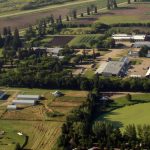In some people’s eyes, Trish Fournier isn’t a farmer. That’s OK by her. She doesn’t think she’s a farmer either. Instead, she’s a farm manager, part of a new generation of managers poised to revolutionize North American agriculture.
In the U.S., 15 per cent of farmers have already turned their operations over to professional management companies. That’s one farm in seven, and the reason is simple. Because of their volume discounts and access to top-line agronomic advice, these management companies are out-yielding and out-profiting all other sectors, including the ultra-large farms that had threatened to steamroller the U.S. ag economy.
Read Also

How scientists are using DNA and climate data to breed crops of the future
A method for forecasting how crops will perform in different environments so that plant breeders can quickly select the best parents for new, climate-resilient varieties.
In Canada, professional management companies are mostly in the drawing-board stage, not out there signing up farm clients. But that doesn’t mean farmers aren’t making decisions on their own.
Trish Fournier is the manager of Lake Erie Farms, a Courtland, Ont. farm just north of the lake that gives it its name. The farm incorporated over 80 years ago and has always been innovative and entrepreneurial. In fact, at one time it included Ontario’s largest tobacco farm.
Tobacco is gone, but the farm that Fournier manages is now a diversified farm business, with major investments in greenhouse production and a sod farm division at www.grasscape.com.
It’s a family farm. The land is all owned by three descendants of the original founder of the farm, although two of them live outside of Canada. But it’s a family farm with a difference.
Fournier is a farm manager with a difference too. In fact, that’s why she was hired. She doesn’t have any formal education in agriculture. Instead, she has a business degree from Wilfred Laurier University and she is a graduate of the executive development program through the George Morris Centre.
Fournier says the benefit of hiring a professional manager really depends on the skills the farm operator already has. “Hiring a manager for your farm may not be a benefit if you already have the necessary business skills, or if you or a family member can acquire those skills,” she agrees.
But you have to listen to her closely. She isn’t saying that hiring a manager wouldn’t bring a lot of benefit if you already know how to put seed in the ground. She’s suggesting that if your farm isn’t being rigorously managed as a business, maybe you should have another think.
According to Fournier, a major part of the job of manager is to develop budgets and to compare actual results with the budgets on a regular basis, something that isn’t done on many farms. “Are you doing ratio analysis and making risk assessments?” she asks.
She also does present-value determinations of capital purchases. “Will that purchase provide a positive return to the business over time or is the decision to purchase an emotional one rather than a financial decision?” she asks.
“Developing and setting goals and objectives is very important,” Fournier says. “It is also important to regularly and formally review those goals to see if we are where we want to be. Our company reviews our goals semi-annually and reviews our mission and vision every two to three years.”
To do that, Fournier is at the very centre of farm decision making, which brings its own benefits.
Bob Mitchell, a Vancouver Island farmer and current president of the Island Farmers Association, says he is seeing some of those benefits too. Mitchell recently incorporated his farm as part of the succession strategy he is implementing for his operation.
At 72, Mitchell wanted to ensure the farm would continue even if there are family conflicts that, if unresolved, could spell the demise of the farm he had worked so hard to build.
As with other farm corporations, Mitchell created a board of directors of family members to oversee the family farm corporation.
But unlike most incorporated farms, the new board of directors didn’t select a family member to run the farm. Instead, they hired a manager with no farm experience.
“The hiring of the farm manager was a decision made by the board of directors,” Mitchell says. “We hired Adam Saab because he is a very good manager.
“A good manager can manage any business, including this farm,” Mitchell believes. And Mitchell also believes he got what he wanted. “By hiring Adam we know that this farm will keep going independent of any family conflicts.”
U.S. grows faster
Canada is rich in technical advisers, crop consultants, and marketing analysts who sell services to Canadian growers. However, these services basically gather and disseminate information. It’s still the farmer who makes the decision.
A professional farm manager goes the next step and actually makes the daily decisions needed to operate the farm in a profitable and sustainable manner. It is a role that few Canadian farmers seem willing to trust to someone else.
But in the business world, from neighbourhood stores to large corporations, ownership recognizes the importance of hiring a good manager.
With the complexity and cost of operating a farm steadily increasing, so are the predictions that Canada will eventually head down that path, just as the U.S. has already done.
In fact, when farmers tell him that they’re trying to figure out whether it makes more sense to rent their land or sell out, University of Minnesota economist Ward Nefstead tells them to also weigh the benefits of employing a professional land-management company to farm the land.
Twice the net income, and then some
It still raises eyebrows, but a study Nefstead conducted in 2003 entitled “Differences in Financial Performance between Professionally Managed and Large Scale Commercial Farms: A Minnesota Example” found the highest returns to landowners in Minnesota came when the land was managed by a land management company, even surpassing the return to land earned on large commercial farms.
Nefstead compared data from mid-and top-performing Minnesota farms with the returns that landowners were getting from two farm management companies. He found direct costs of corn production averaged 73 per cent of gross revenue on commercial farms, but were only 54 per cent of gross on the two professionally managed farms. (Soybean costs were fairly similar for both types of operations.)
When Nefstead compared actual 2003 net incomes, he found commercial farmers were averaging $64 per acre for corn and $53 per acre for soybeans, while the actual returns on professionally managed farms averaged $153 per acre for corn and $113 for soybeans on the farms operated by the two land management companies.
Nefstead says there are a number of reasons why professional land management companies can achieve higher farming returns than large commercial farms.
“The management companies had at least 10 per cent higher average yields than neighboring large commercial farms,” Nefstead points out. “Since most management companies work for a percentage of gross revenue, many large land management companies have agronomists on staff to maximize yields.”
Management companies don’t hesitate to hire outside consultants as needed, Nefstead says, and professional managers have a lot more training and more resources at their disposal than are typically found even on large commercial farms.
Nefstead also points out that the economics of scale which led to the dominance of the large commercial farm provide an even greater benefit to the professionally managed farm.
According to Nefstead, while a large farm may be 10,000 acres in Minnesota, most professional farm managers in the U.S. are responsible for 20,000 to 55,000 acres.
Some land management companies now have offices nationwide, and a few even manage farms internationally. “Farm management companies enjoy large discounts on prices of chemical, seed, fertilizer, and interest,” Nefstead adds. “These companies obtain cheaper credit than even large farms. Cost of production can be 20 to 40 per cent lower than costs on a large farm.”
But it boils down to…
Nefstead says the biggest benefit a professional manager brings to a farm is business training and adherence to good business principles. Indeed, professional land managers must completed a two-to three-year farm management training program for accreditation by the American Society of Farm Managers and Rural Appraisers (ASFMRA) and continue to upgrade their skills through annual education.
Determining the long-term goals of the landowner and developing a strategic plan to achieve those goals is another focus of a professional manager. “If you rent out your land, a landowner often does not know what the renter is going to do with the land,” Nefstead says. “When you hire a professional manager, you can expect annual discussions about your goals as the landowner and regular financial and production updates, often on a monthly basis during the growing season.”
ASFMRA figures show over 60 per cent of U.S. farmland is now farmed by someone other than the landowner. In that environment, professional land management is growing rapidly. It is estimated over 15 per cent of the farmland in the U.S. is now operated by a professional manager employed by a land management company.
In 2003 professional farm management companies were already managing over 25 million acres in the U.S. for absentee landlords, banks, and trusts Given the average age of farmers is continuing to increase and land is considered a safe and good investment, it is likely the demand for professional farm managers will continue to increase.
Meanwhile, the farm management companies are growing too. Nefstead surveyed farm management companies with offices in Minnesota and found they were managing up to one million acres, and that the number of farm managers on staff in these companies ranged from three managers to 77.
Nefstead compares hiring a farm manager to hiring a general contractor when you are building a house. Sure, you can act as your own general contractor but unless you have the building skills, labour-management skills, business skills, and access to the building materials you need, it may be more expensive and frustrating to build your own house than hiring a general contractor to oversee the building.
Besides, says Nefstead, the contracts can be flexible. If the farmer wants to do some or even a lot of the work, that can be worked out too, although the farmer may have to bid for it.
In fact, Nefstead thinks professional management may be a way for farmers to continue to do the work which they really enjoy on the farm and keep their rural lifestyle while still reaping the benefits of having a professional manager for their business, plus the economics of scale of a large farm.
Learning at Lake Erie Farms
Lake Erie’s Fournier also sees value in adding professionals to the board of directors of a corporate farm. “Adding professional, non-family members to the board table can bring a higher level of expertise and experience when it comes to tough decisions, anticipating change, and identifying new opportunities,” she says. “They can provide resources and wisdom that the business would not normally be able to afford to hire.”
The board’s role is to ensure that the family’s short-term needs are balanced with the family and business longer term needs, Fournier adds. “This gets more important as the business progresses through generations since more owners typically means varying interests and concerns by the group.
“At times family members — particularly if they are new — can have unrealistic expectations of what the business can provide them. Independent directors can more easily get beyond the personalities and family dynamics that may impede business success.”
Fournier does point out that hiring a professional manager doesn’t guarantee the farm will do better, especially if the manager “does not have any skin in the game, an incentive to do well, or a passion for the business.”
Still, the benefits of having an astute, skilled business manager injecting skills and insights into the business means there’s a place for the new breed of farm managers in Canadian agriculture, she says. They may even help agriculture evolve to the next level. “Often,” she says, “it is hard to see your own limitations.”CG
———
Could Trish Fournier out-manage you on your own farm? Well, she asks, “Are you doing ratio analysis and making risk assessments?”















